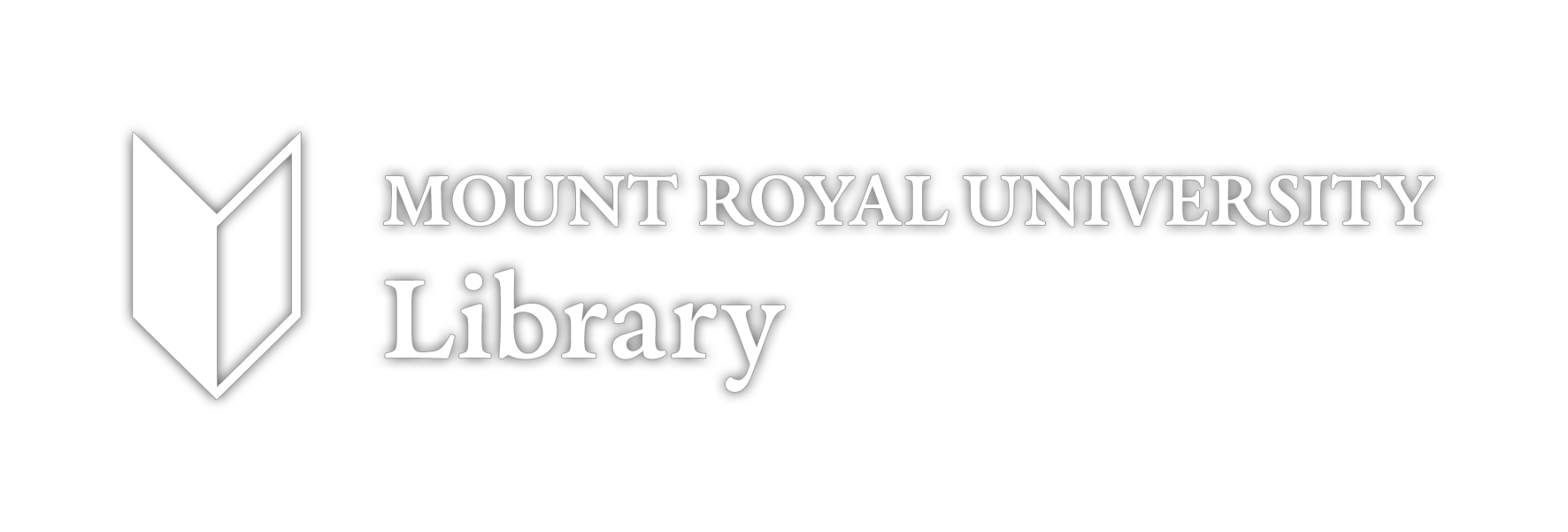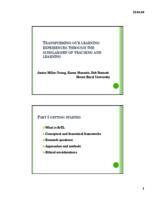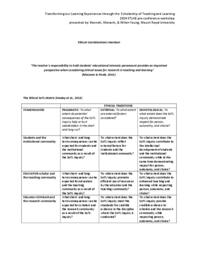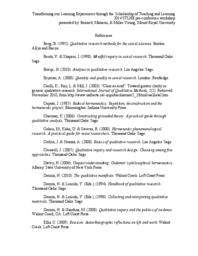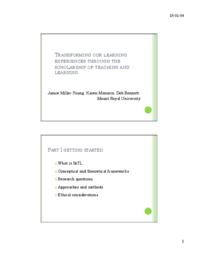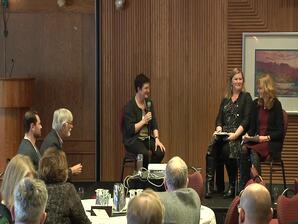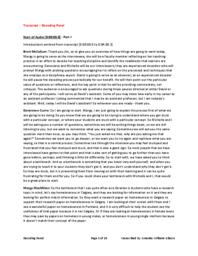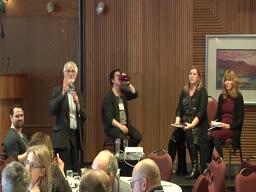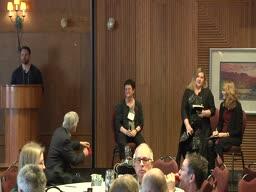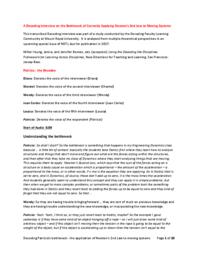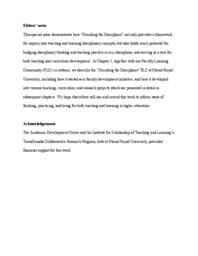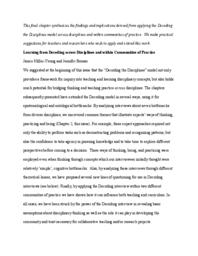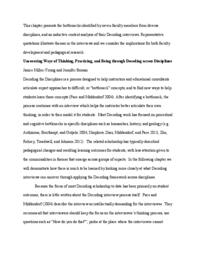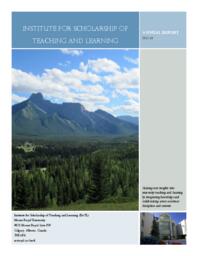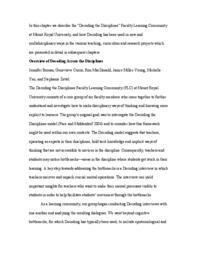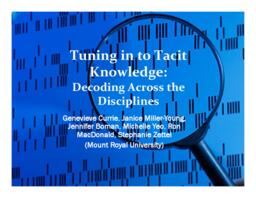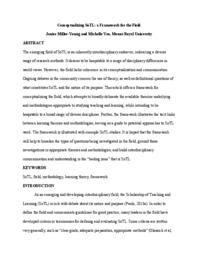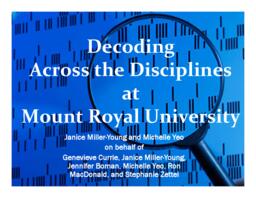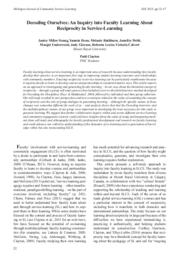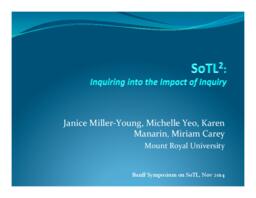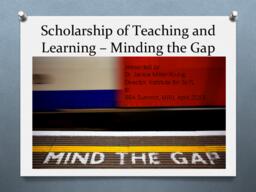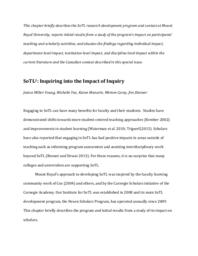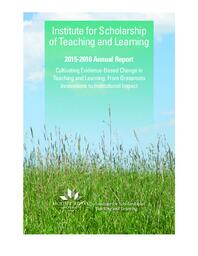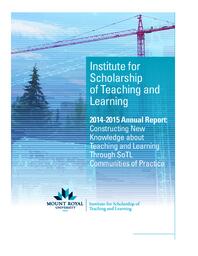Miller-Young, Janice
Person Preferred Name
Janice Miller-Young
Related Works
Content type
Compound Object
Description / Synopsis
This pre-conference workshop will support participants in designing and/or refining a scholarly investigation of student learning in their class, from developing or refining a research question, through ethical considerations, methods, data analysis, and dissemination. Part I (morning) Getting started Participants will: • Learn what SoTL is and how to get started • Discuss conceptual frameworks that can inform the study • Share, generate and refine research questions related to student learning • Explore different approaches and methods for generating and analyzing data • Think through ethical considerations involved in SoTL This 3 hour session will be a combination of plenary presentations and small group activities. After a brief introduction to the scholarship of teaching and learning, participants will work in small groups led by facilitators as they identify something in their teaching practice that they are curious about. The small groups will develop and refine research questions. Different research designs and approaches will be presented as individuals have a chance to see what features seem to fit their orientation and research question, along with discussion of the “fallacies of SoTL” (Grauerholz and Main). Common ethical dilemmas will be explored through case studies. An ethical matrix (TLI 1.2) will help participants think through ethical concerns. Part II (afternoon) I have data; now what? Participants will: • Learn more about approaches, methods and methodology • Practice analyzing data • Develop strategies for moving from data to evidence • Explore dissemination options This 3 hour session will be a combination of plenary presentations and small group activities. Participants will learn more about methods and methodology. Depending on participant interest, various methodologies will be explored. These approaches could include traditional approaches of grounded theory and case study, the interpretive approaches, critical theory, quantitative approaches and experimental designs. Participants in small groups will have the opportunity to practice analyzing data. Participants will also be led through strategies to move from data to evidence. The session will end with a discussion of dissemination options including conference presentations and publications. At the conclusion of the workshop, participants will be able to: • Articulate one or more questions about student learning that they could investigate through a SoTL project • Provide examples of conceptual frameworks that inform their learning goals • Compare and contrast various methods for assessing student learning • Compare and contrast various methods for analyzing data • Design a SoTL inquiry to investigate student learning • Choose dissemination venues appropriate to their goals We would like to acknowledge the SoTL Canada SIG, of which the presenters are members, for generating the idea for developing this proposal.
Origin Information
Content type
Digital Document
Description / Synopsis
This pre-conference workshop will support participants in designing and/or refining a scholarly investigation of student learning in their class, from developing or refining a research question, through ethical considerations, methods, data analysis, and dissemination. Part I (morning) Getting started Participants will: • Learn what SoTL is and how to get started • Discuss conceptual frameworks that can inform the study • Share, generate and refine research questions related to student learning • Explore different approaches and methods for generating and analyzing data • Think through ethical considerations involved in SoTL This 3 hour session will be a combination of plenary presentations and small group activities. After a brief introduction to the scholarship of teaching and learning, participants will work in small groups led by facilitators as they identify something in their teaching practice that they are curious about. The small groups will develop and refine research questions. Different research designs and approaches will be presented as individuals have a chance to see what features seem to fit their orientation and research question, along with discussion of the “fallacies of SoTL” (Grauerholz and Main). Common ethical dilemmas will be explored through case studies. An ethical matrix (TLI 1.2) will help participants think through ethical concerns. Part II (afternoon) I have data; now what? Participants will: • Learn more about approaches, methods and methodology • Practice analyzing data • Develop strategies for moving from data to evidence • Explore dissemination options This 3 hour session will be a combination of plenary presentations and small group activities. Participants will learn more about methods and methodology. Depending on participant interest, various methodologies will be explored. These approaches could include traditional approaches of grounded theory and case study, the interpretive approaches, critical theory, quantitative approaches and experimental designs. Participants in small groups will have the opportunity to practice analyzing data. Participants will also be led through strategies to move from data to evidence. The session will end with a discussion of dissemination options including conference presentations and publications. At the conclusion of the workshop, participants will be able to: • Articulate one or more questions about student learning that they could investigate through a SoTL project • Provide examples of conceptual frameworks that inform their learning goals • Compare and contrast various methods for assessing student learning • Compare and contrast various methods for analyzing data • Design a SoTL inquiry to investigate student learning • Choose dissemination venues appropriate to their goals We would like to acknowledge the SoTL Canada SIG, of which the presenters are members, for generating the idea for developing this proposal.
Origin Information
Content type
Digital Document
Description / Synopsis
This pre-conference workshop will support participants in designing and/or refining a scholarly investigation of student learning in their class, from developing or refining a research question, through ethical considerations, methods, data analysis, and dissemination. Part I (morning) Getting started Participants will: • Learn what SoTL is and how to get started • Discuss conceptual frameworks that can inform the study • Share, generate and refine research questions related to student learning • Explore different approaches and methods for generating and analyzing data • Think through ethical considerations involved in SoTL This 3 hour session will be a combination of plenary presentations and small group activities. After a brief introduction to the scholarship of teaching and learning, participants will work in small groups led by facilitators as they identify something in their teaching practice that they are curious about. The small groups will develop and refine research questions. Different research designs and approaches will be presented as individuals have a chance to see what features seem to fit their orientation and research question, along with discussion of the “fallacies of SoTL” (Grauerholz and Main). Common ethical dilemmas will be explored through case studies. An ethical matrix (TLI 1.2) will help participants think through ethical concerns. Part II (afternoon) I have data; now what? Participants will: • Learn more about approaches, methods and methodology • Practice analyzing data • Develop strategies for moving from data to evidence • Explore dissemination options This 3 hour session will be a combination of plenary presentations and small group activities. Participants will learn more about methods and methodology. Depending on participant interest, various methodologies will be explored. These approaches could include traditional approaches of grounded theory and case study, the interpretive approaches, critical theory, quantitative approaches and experimental designs. Participants in small groups will have the opportunity to practice analyzing data. Participants will also be led through strategies to move from data to evidence. The session will end with a discussion of dissemination options including conference presentations and publications. At the conclusion of the workshop, participants will be able to: • Articulate one or more questions about student learning that they could investigate through a SoTL project • Provide examples of conceptual frameworks that inform their learning goals • Compare and contrast various methods for assessing student learning • Compare and contrast various methods for analyzing data • Design a SoTL inquiry to investigate student learning • Choose dissemination venues appropriate to their goals We would like to acknowledge the SoTL Canada SIG, of which the presenters are members, for generating the idea for developing this proposal.
Origin Information
Content type
Digital Document
Description / Synopsis
This pre-conference workshop will support participants in designing and/or refining a scholarly investigation of student learning in their class, from developing or refining a research question, through ethical considerations, methods, data analysis, and dissemination. Part I (morning) Getting started Participants will: • Learn what SoTL is and how to get started • Discuss conceptual frameworks that can inform the study • Share, generate and refine research questions related to student learning • Explore different approaches and methods for generating and analyzing data • Think through ethical considerations involved in SoTL This 3 hour session will be a combination of plenary presentations and small group activities. After a brief introduction to the scholarship of teaching and learning, participants will work in small groups led by facilitators as they identify something in their teaching practice that they are curious about. The small groups will develop and refine research questions. Different research designs and approaches will be presented as individuals have a chance to see what features seem to fit their orientation and research question, along with discussion of the “fallacies of SoTL” (Grauerholz and Main). Common ethical dilemmas will be explored through case studies. An ethical matrix (TLI 1.2) will help participants think through ethical concerns. Part II (afternoon) I have data; now what? Participants will: • Learn more about approaches, methods and methodology • Practice analyzing data • Develop strategies for moving from data to evidence • Explore dissemination options This 3 hour session will be a combination of plenary presentations and small group activities. Participants will learn more about methods and methodology. Depending on participant interest, various methodologies will be explored. These approaches could include traditional approaches of grounded theory and case study, the interpretive approaches, critical theory, quantitative approaches and experimental designs. Participants in small groups will have the opportunity to practice analyzing data. Participants will also be led through strategies to move from data to evidence. The session will end with a discussion of dissemination options including conference presentations and publications. At the conclusion of the workshop, participants will be able to: • Articulate one or more questions about student learning that they could investigate through a SoTL project • Provide examples of conceptual frameworks that inform their learning goals • Compare and contrast various methods for assessing student learning • Compare and contrast various methods for analyzing data • Design a SoTL inquiry to investigate student learning • Choose dissemination venues appropriate to their goals We would like to acknowledge the SoTL Canada SIG, of which the presenters are members, for generating the idea for developing this proposal.
Origin Information
Content type
Digital Document
Description / Synopsis
This pre-conference workshop will support participants in designing and/or refining a scholarly investigation of student learning in their class, from developing or refining a research question, through ethical considerations, methods, data analysis, and dissemination. Part I (morning) Getting started Participants will: • Learn what SoTL is and how to get started • Discuss conceptual frameworks that can inform the study • Share, generate and refine research questions related to student learning • Explore different approaches and methods for generating and analyzing data • Think through ethical considerations involved in SoTL This 3 hour session will be a combination of plenary presentations and small group activities. After a brief introduction to the scholarship of teaching and learning, participants will work in small groups led by facilitators as they identify something in their teaching practice that they are curious about. The small groups will develop and refine research questions. Different research designs and approaches will be presented as individuals have a chance to see what features seem to fit their orientation and research question, along with discussion of the “fallacies of SoTL” (Grauerholz and Main). Common ethical dilemmas will be explored through case studies. An ethical matrix (TLI 1.2) will help participants think through ethical concerns. Part II (afternoon) I have data; now what? Participants will: • Learn more about approaches, methods and methodology • Practice analyzing data • Develop strategies for moving from data to evidence • Explore dissemination options This 3 hour session will be a combination of plenary presentations and small group activities. Participants will learn more about methods and methodology. Depending on participant interest, various methodologies will be explored. These approaches could include traditional approaches of grounded theory and case study, the interpretive approaches, critical theory, quantitative approaches and experimental designs. Participants in small groups will have the opportunity to practice analyzing data. Participants will also be led through strategies to move from data to evidence. The session will end with a discussion of dissemination options including conference presentations and publications. At the conclusion of the workshop, participants will be able to: • Articulate one or more questions about student learning that they could investigate through a SoTL project • Provide examples of conceptual frameworks that inform their learning goals • Compare and contrast various methods for assessing student learning • Compare and contrast various methods for analyzing data • Design a SoTL inquiry to investigate student learning • Choose dissemination venues appropriate to their goals We would like to acknowledge the SoTL Canada SIG, of which the presenters are members, for generating the idea for developing this proposal.
Origin Information
Content type
Compound Object
Description / Synopsis
Scholars of teaching and learning around the world and in many disciplines have been using the Decoding the Disciplines process to make explicit the mental operations that students must master to succeed. Teachers, as experts in their disciplines, often hold this knowledge in tacit and implicit ways that are not easily accessible to novices, resulting in "bottlenecks" to learning. A key step towards addressing bottlenecks is a Decoding interview in which teachers uncover and unpack crucial thinking with the help of two interviewers outside their field. The interview can yield important insights for teachers, generate data for SoTL work, and also play an important role in developing the community and trust necessary for collaborative teaching and research projects. To illustrate how an interview unfolds, this plenary will feature a live Decoding interview conducted by experienced Decoders from Mount Royal University, with follow-up commentary and discussion facilitated by Dr. David Pace.
Origin Information
Content type
Digital Document
Description / Synopsis
Scholars of teaching and learning around the world and in many disciplines have been using the Decoding the Disciplines process to make explicit the mental operations that students must master to succeed. Teachers, as experts in their disciplines, often hold this knowledge in tacit and implicit ways that are not easily accessible to novices, resulting in "bottlenecks" to learning. A key step towards addressing bottlenecks is a Decoding interview in which teachers uncover and unpack crucial thinking with the help of two interviewers outside their field. The interview can yield important insights for teachers, generate data for SoTL work, and also play an important role in developing the community and trust necessary for collaborative teaching and research projects. To illustrate how an interview unfolds, this plenary will feature a live Decoding interview conducted by experienced Decoders from Mount Royal University, with follow-up commentary and discussion facilitated by Dr. David Pace.
Origin Information
Content type
Video
Description / Synopsis
Scholars of teaching and learning around the world and in many disciplines have been using the Decoding the Disciplines process to make explicit the mental operations that students must master to succeed. Teachers, as experts in their disciplines, often hold this knowledge in tacit and implicit ways that are not easily accessible to novices, resulting in "bottlenecks" to learning. A key step towards addressing bottlenecks is a Decoding interview in which teachers uncover and unpack crucial thinking with the help of two interviewers outside their field. The interview can yield important insights for teachers, generate data for SoTL work, and also play an important role in developing the community and trust necessary for collaborative teaching and research projects. To illustrate how an interview unfolds, this plenary will feature a live Decoding interview conducted by experienced Decoders from Mount Royal University, with follow-up commentary and discussion facilitated by Dr. David Pace.
Origin Information
Content type
Video
Description / Synopsis
Scholars of teaching and learning around the world and in many disciplines have been using the Decoding the Disciplines process to make explicit the mental operations that students must master to succeed. Teachers, as experts in their disciplines, often hold this knowledge in tacit and implicit ways that are not easily accessible to novices, resulting in "bottlenecks" to learning. A key step towards addressing bottlenecks is a Decoding interview in which teachers uncover and unpack crucial thinking with the help of two interviewers outside their field. The interview can yield important insights for teachers, generate data for SoTL work, and also play an important role in developing the community and trust necessary for collaborative teaching and research projects. To illustrate how an interview unfolds, this plenary will feature a live Decoding interview conducted by experienced Decoders from Mount Royal University, with follow-up commentary and discussion facilitated by Dr. David Pace.
Origin Information
Content type
Digital Document
Origin Information
Content type
Digital Document
Origin Information
Content type
Digital Document
Origin Information
Content type
Digital Document
Origin Information
Content type
Digital Document
Origin Information
Content type
Digital Document
Origin Information
Content type
Digital Document
Origin Information
Content type
Digital Document
Origin Information
Content type
Digital Document
Origin Information
Content type
Digital Document
Origin Information
Content type
Digital Document
Origin Information
Content type
Digital Document
Origin Information
